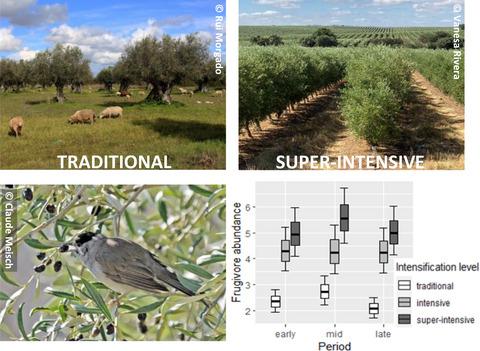当前位置:
X-MOL 学术
›
J. Appl. Ecol.
›
论文详情
Our official English website, www.x-mol.net, welcomes your
feedback! (Note: you will need to create a separate account there.)
Preserving wintering frugivorous birds in agro-ecosystems under land use change: Lessons from intensive and super-intensive olive orchards
Journal of Applied Ecology ( IF 5.0 ) Pub Date : 2021-09-18 , DOI: 10.1111/1365-2664.14029 Rui Morgado 1, 2, 3 , Rui Pedroso 2 , Miguel Porto 1, 2 , José M. Herrera 4 , Francisco Rego 3 , Francisco Moreira 1, 2 , Pedro Beja 1, 2
中文翻译:

在土地利用变化下保护农业生态系统中的越冬食果鸟类:来自集约化和超集约化橄榄园的经验教训
更新日期:2021-09-18
Journal of Applied Ecology ( IF 5.0 ) Pub Date : 2021-09-18 , DOI: 10.1111/1365-2664.14029 Rui Morgado 1, 2, 3 , Rui Pedroso 2 , Miguel Porto 1, 2 , José M. Herrera 4 , Francisco Rego 3 , Francisco Moreira 1, 2 , Pedro Beja 1, 2
Affiliation

|
- Fleshy fruit production is becoming more intensive worldwide, but how this affects frugivorous birds is poorly known. In the Mediterranean region, intensive and super-intensive olive orchards are fast expanding, potentially affecting millions of wintering songbirds. Here, we test the idea that intensification may benefit frugivorous birds, at least locally, due to increased fruit availability, while negatively affecting the wider wintering bird community due to intensive management, structural simplification and landscape homogenisation.
- We estimated olive abundance and surveyed birds in early, mid- and late winter, at traditional, intensive and super-intensive orchards in southern Portugal. We used Hierarchical Modelling of Species Communities to relate species richness, prevalence and abundance to management intensity, winter period, olive availability and landscape context, and evaluated the role of frugivory in modulating observed responses.
- Olive availability was much higher throughout the winter in more intensive than in traditional orchards, both in trees and on the ground. Frugivorous bird abundance was higher in more intensive orchards, and the most abundant frugivorous species (blackcap, song thrush, robin) were positively affected by olive availability and/or increasing landscape cover by olive orchards, while intensification level had relatively minor effects after accounting for other variables. Non-frugivorous richness and abundance were higher in traditional orchards, and many non-frugivorous species had lower prevalence in more intensive orchards or were negatively affected by landscapes dominated by olive cultivation.
- Synthesis and applications. While negatively affecting the wider bird community, our results suggest that olive farming intensification can contribute to sustaining large numbers of frugivorous birds in the Mediterranean region. As frugivorous birds are not seen as damaging by olive farmers, there is an opportunity to promote their conservation in intensive and super-intensive orchards, which requires management to increase habitat heterogeneity, and to reduce risks such as mortality associated with mechanical harvest and contamination with pesticide residues. Overall, we recommend that efforts to manage farmland biodiversity should consider the impacts and conservation opportunities of fruit crop intensification.
中文翻译:

在土地利用变化下保护农业生态系统中的越冬食果鸟类:来自集约化和超集约化橄榄园的经验教训
- 世界范围内的肉果生产变得越来越密集,但这对食果鸟类有何影响却鲜为人知。在地中海地区,集约化和超集约化橄榄园正在迅速扩大,可能影响数百万越冬鸣禽。在这里,我们测试了集约化可能使食果鸟类受益的想法,至少在局部,由于水果供应增加,同时由于集约化管理、结构简化和景观同质化而对更广泛的越冬鸟类群落产生负面影响。
- 我们在葡萄牙南部的传统、集约化和超集约化果园估计了早、中、晚冬的橄榄丰度并调查了鸟类。我们使用物种群落分层模型将物种丰富度、流行度和丰度与管理强度、冬季、橄榄可用性和景观背景联系起来,并评估了果蔬在调节观察到的反应中的作用。
- 在比传统果园更密集的情况下,整个冬季的橄榄可用性要高得多,无论是在树上还是在地面上。更密集的果园中食果鸟类的丰度更高,最丰富的食果物种(黑帽鸭、画眉、知更鸟)受到橄榄可用性和/或橄榄园景观覆盖率增加的积极影响,而集约化水平在考虑之后的影响相对较小其他变量。传统果园的非食果植物丰富度和丰度较高,许多非食果物种在更密集的果园中的流行率较低,或者受到以橄榄种植为主的景观的负面影响。
- 合成与应用。虽然对更广泛的鸟类群落产生负面影响,但我们的研究结果表明,橄榄种植集约化有助于维持地中海地区大量食果鸟类。由于橄榄农并不认为食果鸟类具有破坏性,因此有机会在集约化和超集约化果园中促进它们的保护,这需要进行管理以增加栖息地异质性,并降低风险,例如与机械收获相关的死亡和污染农药残留。总体而言,我们建议管理农田生物多样性的努力应考虑水果作物集约化的影响和保护机会。










































 京公网安备 11010802027423号
京公网安备 11010802027423号